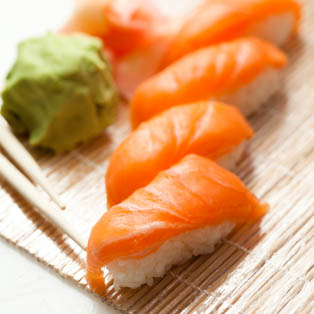News
Super special sushi
Wednesday, March 16th, 2011
Like stacking a braai fire, it’s a ritual most South Africans have come to know by heart: dispensing the soya sauce into the delicate ceramic bowl, liberating the wooden chopsticks from their paper wrapper and prying them apart with a satisfying snap. It’s almost as fun – but not quite – as carefully picking up the treasured seafood morsel and dunking it into the gloriously salty liquid before bringing it to your mouth.
By some miracle, a country known for its love of rys, vleis en aartappels has, in the last decade and a half, gone completely bonkers for sushi, with everyone from worldly ad execs to book club tannies from the platteland deeming the Japanese delicacy a treat.
Not surprisingly, this raw-fish phenomenon has resulted in quite the bun fight among local restaurants, with even the most unlikely of eateries trying to muscle in on the action. So what makes sushi so popular amongst us South African folk?
According to Cape Town sushi mecca, Sevruga’s general manager, David Edwards, climate and conviviality has a lot to do with it. “South Africa is the perfect country for eating sushi, since we’ve got such great weather. It’s ideal for a light lunch outside and it’s also a lot of fun to eat, because diners are encouraged to share and swap.”
“Sushi is one of the healthier things you can eat in a restaurant,” says Cape Town Fish Market Fourways’ manager Lloyd Magirita. “There’s a growing trend towards healthier living, but with sushi, people still feel like they’re having a treat, even though it’s good for them.”
Director of the Caviar Group and manager of Beluga, Oscar Kotze, agrees with Lloyd: “You can’t have rump steak and chips four days of the week, but you can easily do that with sushi. We have regular customers eating sushi six times a week!”
Given sushi’s unmistakable popularity on our shores, sushi specials seem to have become a ubiquitous presence on most restaurant menus, so much so that many diners have come to expect them. Which brings us to the next question: how can restaurants afford to keep these often permanent specials going?
According to David, it’s not so much that half-price sushi turns a huge profit as it’s good PR for the restaurant. “Sushi specials draw crowds, and for passers by, a full restaurant looks more inviting than a half-empty one,” he says. He continues to say that the specials serve as a stepping stone to getting people into the restaurant. “It’s not like a restaurant makes all of its money from sushi specials,” he says. “Often a group will come to the restaurant because of a special, but half of them will end up ordering something completely different.”
Oscar, who is at the helm of perhaps the most popular sushi haunt in Cape Town, explains it as follows: “Since we do volumes of up to 50 000kg of salmon a year, we get very competitive pricing from our suppliers. Due to the amount of sushi we sell, we also get great prices on most of the Chinese ingredients. Lastly, if you keep the prices down, people will be happy and come back again and again.”
Asked what the secret ingredient is to make the perfect sushi, Oscar answers, “Great quality fish and fresh, authentic rice. But, then there’s the touchy-feely bit: if you have great sushi chefs who love what they do, the sushi just tastes better. We have a couple that has been coming here since we opened, and they love Beluga, and I love them.”
On that note, here’s a list of other super-special sushi restaurants Eat Out loves:
Johannesburg
Check out the specials at:
We also love:
Pretoria
Durban
Check out the specials at:
We also love:
East London
Check out the specials at:
Cape Town
Check out the specials at:
We also love:








